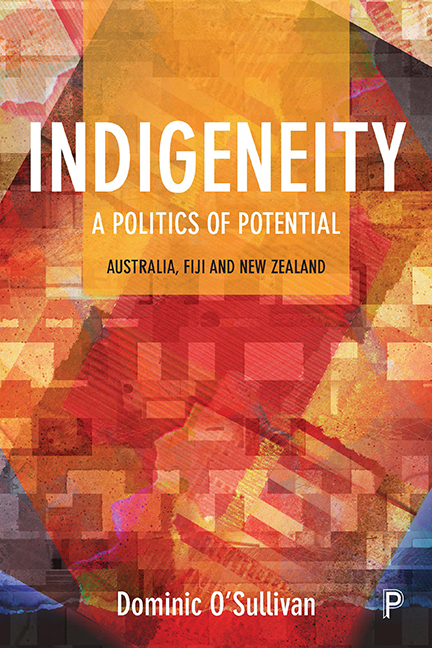Book contents
- Frontmatter
- Dedication
- Contents
- Acknowledgements
- Introduction
- one Reconciliation
- two The politics of indigeneity
- three Liberal democracy and differentiated citizenship
- four Liberal democratic inclusion
- five Indigeneity and contemporary globalisation
- six Economic development as differentiated citizenship: Australia
- seven Economic development as differentiated citizenship: New Zealand
- eight Economic development as differentiated citizenship: Fiji
- Conclusion
- References
- Index
eight - Economic development as differentiated citizenship: Fiji
Published online by Cambridge University Press: 05 April 2022
- Frontmatter
- Dedication
- Contents
- Acknowledgements
- Introduction
- one Reconciliation
- two The politics of indigeneity
- three Liberal democracy and differentiated citizenship
- four Liberal democratic inclusion
- five Indigeneity and contemporary globalisation
- six Economic development as differentiated citizenship: Australia
- seven Economic development as differentiated citizenship: New Zealand
- eight Economic development as differentiated citizenship: Fiji
- Conclusion
- References
- Index
Summary
Introduction
Indigenous Fijians’ relative lack of economic self-determination occurs at the intersection of political instability, incoherent understandings of the nature of political relationships and the underutilisation of natural resources. Of this book's three nations of interest it is Fiji that most lacks a coherent philosophy of indigenous self-determination, which is the point that most significantly sets that country's indigenous politics apart from those of Australia and New Zealand. Although the indigenous Australian pursuit of self-determination occurs in a contradictory and philosophically inconsistent policy environment and the aspiration is by no means assured in New Zealand, it is clear that the indigenous peoples of both those jurisdictions have well developed understandings of what self-determination means and its relationship to broader political philosophies, opportunities and constraints. Self-determination in Australia and New Zealand is also responsive to the prevailing economic environment.
The absence of meaningful indigenous Fijian self-determination occurs as economic growth over the 30 years to 2011 averaged 2.1 per cent of GDP (Chand, 2015). Just as it is in Australia and New Zealand, Fijian indigenous economic development is complex and contested; complicated because: ‘The present in terms of the level of economic development in Fiji can be explained by the past, and particularly the distribution of political power’ (Chand, 2015).
Indigenous Fijians own 84 per cent of the country's land, form the greater part of the population, and have, under earlier Constitutions, enjoyed guaranteed parliamentary majorities. Fiji's political culture remains unable to consider the comprehensive land reform that is required to raise the returns to indigenous land holders and, in contrast, New Zealand Maori have relatively higher levels of wealth and political influence because they are able to exercise more proportionate and particular shares in national sovereignty, in stable and secure economic and political environments. Economic weakness is among the outcomes of the pressure that is placed on an aggressively nationalist politics of indigeneity to secure Fijian ‘paramountcy’ through political and economic privilege. Yet the material wellbeing of indigenous Fijians remains heavily dependent on foreign investment which, in contrast, requires political stability. Foreign investment has rarely met government targets of 25 per cent of GDP (Asian Development Bank, 2014).
- Type
- Chapter
- Information
- Indigeneity: A Politics of PotentialAustralia, Fiji and New Zealand, pp. 149 - 164Publisher: Bristol University PressPrint publication year: 2017



